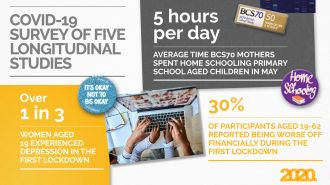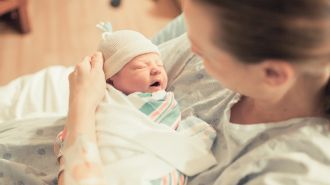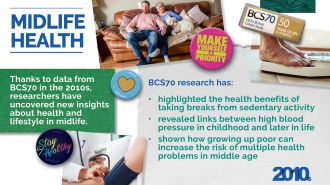- Our studies
- Our research
- Publications and resources
- Data access and training
- About
- News
- Events
- Get in touch
- Join our mailing list
Welcome to our news and blogs section. Here you’ll find the latest developments and insights from across our longitudinal studies.
Growing Up in Digital Europe (GUIDE) is the UK pilot of a major European initiative to create internationally harmonised data for research on child development and wellbeing.

More than one in three British adults are suffering from two or more chronic health conditions in middle age, such as recurrent back problems, mental ill-health, high blood pressure, diabetes, and high-risk drinking, according to UCL researchers.

Researchers can now access new information on the presence of COVID-19 antibodies among more than 10,000 study members taking part in the four cohort studies run by the UCL Centre for Longitudinal Studies (CLS).

Children with severe conduct and hyperactivity problems at school entrance tend to gain lower scores in vocabulary tests during adolescence, according to a new study.

At age 17, 9% of males have carried or used a weapon, with one in four of those involved in this form of serious offending reporting they are gang members, according to UCL researchers.

The Centre for Longitudinal Studies (CLS) is part of the team behind a new cohort study of current Year 11 students, which will investigate the educational and employment inequalities brought about by the COVID-19 crisis.

Substance use and antisocial behaviour are more likely to go hand-in-hand with poor mental health for generation Z teens compared to millennial adolescents growing up a decade earlier, finds a new UCL study.

From this summer, we hope to start catching up with our BCS70 participants to see how they’re faring in their early 50s.

As the pandemic has unfolded we have surveyed participants of five national longitudinal studies, including the 1970 British Cohort Study (BCS70) to track the effects of COVID-19 over time. Here’s a summary of our researchers’ initial findings.

Children conceived through medically assisted reproduction who are born small do just as well in cognitive tests during childhood and adolescence as naturally conceived children who are born a normal weight, finds a new study led by UCL researchers.

Findings from the 1970 British Cohort Study’s Age 46 Biomedical Sweep have helped to improve our understanding of midlife health.

The 1970 British Cohort Study Age 46 Sweep had a significant biomedical focus, with objective health measurements and assessments being conducted for the first time in the cohort members’ adulthood.

Data collected from CLS’s four cohort studies will be used to help improve the understanding of the risk factors, symptoms and treatment of the long term effects of COVID-19, in a major new research project announced today.
Ryan Bradshaw
Senior Communications Officer
Phone: 020 7612 6516
Email: r.bradshaw@ucl.ac.uk